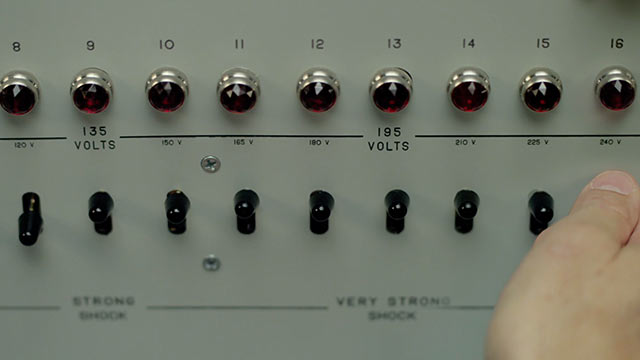The behavioral tests of the 1960s, seeking to understand the psychology behind the Holocaust, have become integral parts of the American landscape. One such test is Stanley Milgram’s 1961 experiment, in which participants were told to test another participant and deliver a series of increasing shocks for wrong answers under the monitoring of an authority figure. The test has become lore, and even reconstructed for prime time entertainment – at least one segment of What Would You Do? conducted the test in a semi-neutered format.
Michael Almereyda’s Experimenter opens with this experiment in progress. By showing the experiment and its mechanics first, Almereyda plays it as Bachman-Turner Overdrive opening their concert with Takin’ Care of Business. Get the staple out of the way, and lets see what else they have.
Depending on your tolerance of biopics and Almereyda abstraction, the remainder of the movie could go either way. Building off the artifice of Milgram’s experiment – he used actors to lie to the students – Almereyda is self-consciously stylized to make the audience question the film’s authority. According to Almereyda, Milgram’s post-experiment life was littered with other, more passive, less controversial, experiments but was always dominated by the shock test. Each decision in his life was colored by the controversy that followed him wherever he went.
The constant referencing to how Experimenter is merely a film, and not an authoritative story, starts out strong and heavy. Walking down a hallway, Milgram is haunted by a giant elephant. Later domestic scenes between Milgram and his wife are acted out on sets resembling sitcom stages. Reminiscent of 2000’s Hamlet – remember the Blockbuster Video speechifying? – the po-mo-lite form adds as much to the film as it detracts. It’s as much heavy-handed symbolism as stylized nonsense. But, by te end of the film, the po-mo style flitters away into a more traditional and conservative biopic structure.
Peter Sarsgaard makes Milgram into a distanced psychologist in tests and life. He retains an abstracted separation from even his closest associates. Though he isn’t played like an Aspie, Sarsgaard’s depiction certainly veers in that direction. In a way, Sarsgaard plays Milgram with the distrust that middle America has towards cold-hearted intellectuals.
Experimenter is challenging, fascinating, messy, and odd. It never fully delivers on the promises it sets up in the first 30 minutes. It’s far more interesting than the traditional form biopics like The King’s Speech, but it ultimately falls into many of the same pitfalls (and, incidentally, it’s yet another biopic detailing the life of a 60’s era white dude). If Experimenter is a slight letdown, it’s only because it opens so strongly with promises left unfulfilled. Yet, it remains strangely filling in the afterglow.


